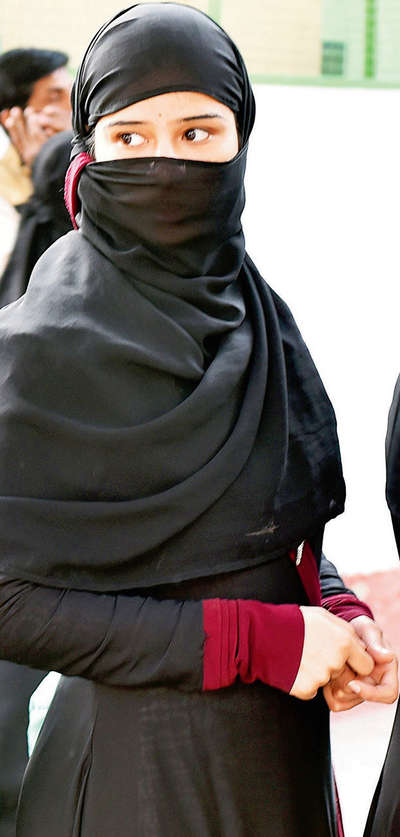Muslim women want to take the law to court

Trupti Desai may be garnering the headlines over Haji Ali, but for Nasreen Contractor, founder of Haji Ali for Everybody, it is an old battle, fought the hard way – through the Indian judiciary. Her PIL filed in November 2012 asking for access for women to the dargah’s mazaar, is still pending in the Bombay High Court.
Even as the case wends its way through the legal system, Contractor and a growing cohort of activists are not sitting quietly but questioning regressive interpretations of the Quran that are entrenched in Muslim Family Law, and in socially-sanctioned practices to maintain a patriarchal status quo. “Earlier, when you would approach a Muslim woman to speak up, the commonest answer would be, ‘I am not allowed’. But now, they think, ask around and find support in women like them,” said Mariam Dhawale, state president, All India Democratic Association (AIDA). AIDA has over 1.25 crore women members, of which 20 per cent are Muslim.
More women are raising their voices, calling for bans on triple talaq, where a man can legally divorce his wife by saying talaq; halala, where a woman cannot remarry a divorced husband unless she has intercourse with another man; child marriage, since the legal marriageable age is the onset of puberty; and gendered polygamy, where men are allowed to marry four times but not women.
Globally, countries with a significant Muslim population such as Morocco, Tunisia, Turkey, Egypt, Jordan and even neighbouring Bangladesh and Pakistan have codified laws.
While the codification may take time, Muslim women are demanding a quick ban on or triple talaq and polygamy. “Both these practices are not in the Quran. They are a part of the community but not a part of the religious text,” said Niaz. The central government has appointed a high level committee to look into the practices spurred by 35-year-old Shayar Banu’s Supreme Court case – she is the first Indian Muslim woman to challenge the law saying it violates her fundamental rights.
Increased awareness and more support has meant a larger push for change. “Women in the community talk about what has been troubling them for decades. They realise that backward ideas prevented their growth,” said Dhawale. However, there are still many hurdles. “The pressure is both from within the community, as well as Hindutva groups. Often, they are branded non-religious,” said Contractor. “Despite the difficulties, Muslim women are definitely speaking up. The hope is from the government now.”
Even as the case wends its way through the legal system, Contractor and a growing cohort of activists are not sitting quietly but questioning regressive interpretations of the Quran that are entrenched in Muslim Family Law, and in socially-sanctioned practices to maintain a patriarchal status quo. “Earlier, when you would approach a Muslim woman to speak up, the commonest answer would be, ‘I am not allowed’. But now, they think, ask around and find support in women like them,” said Mariam Dhawale, state president, All India Democratic Association (AIDA). AIDA has over 1.25 crore women members, of which 20 per cent are Muslim.
More women are raising their voices, calling for bans on triple talaq, where a man can legally divorce his wife by saying talaq; halala, where a woman cannot remarry a divorced husband unless she has intercourse with another man; child marriage, since the legal marriageable age is the onset of puberty; and gendered polygamy, where men are allowed to marry four times but not women.
The Bhartiya Mahila Muslim Andolan (BMMA) been agitating for major modifications to the Muslim Family Law since 2014 and has presented a draft bill to the centre, though the process has stalled there. “With the codification, there will be a tab on age of marriage. Consent for marriage, custody of children, polygamy and maintenance will all get streamlined,” said Noorjehan Safia Niaz, cofounder of BMMA. Niaz maintains that Muslim women have been denied their Quranic rights as well as their rights as equal Indian citizens. The codification of Muslim law will address this by creating clear-cut clauses – as has been done for Hindu and Christian laws. At present, these matters are all left to clerics to adjudicate.
Globally, countries with a significant Muslim population such as Morocco, Tunisia, Turkey, Egypt, Jordan and even neighbouring Bangladesh and Pakistan have codified laws.
While the codification may take time, Muslim women are demanding a quick ban on or triple talaq and polygamy. “Both these practices are not in the Quran. They are a part of the community but not a part of the religious text,” said Niaz. The central government has appointed a high level committee to look into the practices spurred by 35-year-old Shayar Banu’s Supreme Court case – she is the first Indian Muslim woman to challenge the law saying it violates her fundamental rights.
Increased awareness and more support has meant a larger push for change. “Women in the community talk about what has been troubling them for decades. They realise that backward ideas prevented their growth,” said Dhawale. However, there are still many hurdles. “The pressure is both from within the community, as well as Hindutva groups. Often, they are branded non-religious,” said Contractor. “Despite the difficulties, Muslim women are definitely speaking up. The hope is from the government now.”
GALLERIES View more photos











